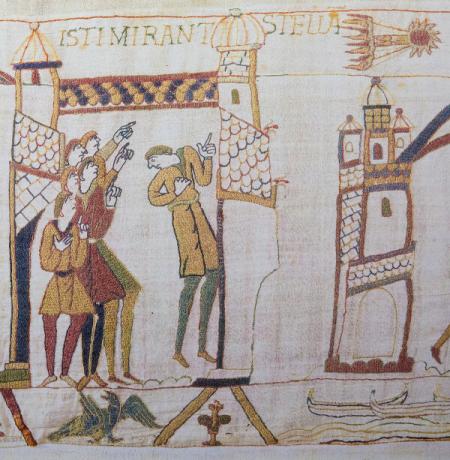Paroxytone words are those that have the stressed syllable in the penultimate syllable, so that it is pronounced more strongly than the others syllables, unlike what happens with oxytone and proparoxytone words, in which the tonic syllable is present in another syllable.
Read too: How to divide syllables?
Summary about paroxytone words
Paroxytonic words are those that have the penultimate syllable as a stressed syllable.
They are the most common words in the Portuguese language.
They can receive a graphic accent (acute accent or circumflex accent) in some cases.
They differ from oxytones (last syllable pronounced stronger) and proparoxytones (antepenultimate syllable pronounced stronger).
What are paroxytone words?
The paroxytone words are those with the penultimate syllable pronounced more strongly than the other syllables of the word. The syllable that we pronounce stronger is called tonic. To identify paroxytones, simply see if the strongest pronounced syllable is the second syllable backwards. See the following examples:
ga - to
Co - It is - son
Walk - laugh - nha
In all these words, the penultimate syllable is the strongest.
List of paroxytone words
Themigo
herecryro
hereI gavefrog
camiifOK
herehuhOK
cuttlefishthereyou
crianhere
iscothere
photographyfiThe
guitarfrog
alreadyhuhthere
therepis
readvro
mesa
problebad
frogdio
remenof
revisOK
sorseeyou
telefohuh
unito seeonly
Rules for accentuating paroxytone words
Some paroxytone words are accented, while others are not. Let's understand when they should be accentuated below.
→ When the word ends in -i, -is, -u or -us
OKxi |
júlaugh |
therepis |
boonudes |
→ When the word ends in -l, -r, or -x
consouth |
cancer |
faithnix |
fancil |
reperto have |
okrax |
→ When the word ends in -n or with a nasal sound (-ã, -ão, -um)
dustLen |
íbad |
thereboom |
abofmen |
bêndog |
nailon |
→ When the word ends in -ps
forceps |
biceps |
Spelling Agreement and paroxytone words
The 1990 Spelling Agreement, which has been in operation in Brazil since 2009 and obligatorily since 2016, changed the accentuation of some paroxytone words. See below.
→ Paroxytones with open diphthongs -ei and -oi do not have an accent
iI gaveThe |
jioxThe |
plateiThe |
joiThe |
→ Paroxytones do not have an accent after a diphthong
feiufrog |
baiuhere |
→ Paroxytones ending in -eem, -oo or -oos do not have an accent
believein |
enjoO |
lein |
perofO |
seein |
grandmotherO |
Paroxytone words and prosody
The prosody Study the pronunciation of words. For example, Some words have more than one correct pronunciation and, in these cases, we say there is double prosody. See some words that can be pronounced as paroxytones (with a stronger penultimate syllable) but also in other ways:
|
Pronunciation like paroxytone |
Pronunciation like proparoxytone |
acrobaOK |
Thecrobeat |
Hieroglifo |
hierhoglyph |
|
Pronunciation like paroxytone |
Pronunciation like oxytone |
projectile |
designtilde |
X andpurple |
X andpurple |
Paroxytone words and syllables
The syllable happens when we get the stressed syllable of the word wrong. Here are some words that are paroxysmal so you don’t get your pronunciation wrong again:
Correct pronunciation as paroxytona |
Incorrect pronunciation as proparoxytone |
Thegoro |
ávarus |
characteryoures |
hereráwteres |
filantrodust |
filântrope |
ibero |
íbero |
rubrihere |
rubrica |
Now, look at words that are not paroxytones and learn which is their true strongest syllable:
Correct pronunciation as proparoxytone |
Correct pronunciation as oxytone |
airwhattype |
misto have |
It isyouthe feet |
At thebel |
ínterim |
ruim |
Differences between paroxytone, proparoxytone and oxytone words
The difference between these words lies in the syllable that we pronounce more strongly.
Classification |
Position of the stressed syllable |
Example |
oxytones |
last |
OKyou |
paroxytones |
penultimate |
to theyouI'm |
proparoxytones |
third to last |
younica |
See too: How are words classified according to the number of syllables?
Solved exercises on paroxytone words
Question 1
Which set only has paroxytone words?
A) Cat – rhinoceros – dragonfly
B) Taxi – bus – metro
C) Bed – blanket – sheet
D) Height – weight – size
Resolution:
Alternative D
In alternative D, all words are paroxytones. In the other alternatives, the words: A) dragonfly; B) buses and subways; and C) blanket and sheet.
Question 2
Look at the highlighted words in the following sentences and mark the one that no It's a paroxyton.
A) Yesterday, my first one fell tooth of milk!
B) Chico has a parrot pet.
C) My favorite fruit is khaki!
D) How many years you have?
Resolution:
Alternative C
The word “persimmon” has the last syllable as its strongest pronounced: ca-Thu. Therefore, it is an oxytonic word, not a paroxytonic one.
Sources
AZEREDO, José Carlos de. Houaiss Grammar of the Portuguese Language. São Paulo: Parabola, 2021.
BECHARA, Evanildo. Modern Portuguese Grammar. 38th ed. Rio de Janeiro: New Frontier, 2015.
CEGAALLA, Domingos Paschoal. Brand new grammar of the Portuguese language. São Paulo: Companhia Editora Nacional, 2020.
CUNHA, Celso; CINTRA, Lindley. New grammar of contemporary Portuguese. 7th ed. Rio de Janeiro: Lexikon, 2016.



